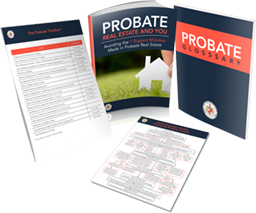Frequently Asked Questions
We understand that navigating probate real estate can raise many questions, and we’re here to provide you with answers. Below, you’ll find answers to some of the most common queries we receive. If you don’t find the information you’re looking for here, please don’t hesitate to reach out to us directly.



What is the probate process, and why is it necessary when someone passes away?
The probate process is a legal procedure that occurs after an individual’s death. It serves several essential purposes:
-
Asset Distribution: It ensures that the deceased person’s assets are distributed to their heirs or beneficiaries according to their wishes (if there’s a will) or according to state laws (if there’s no will).
-
Debt Settlement: It provides a mechanism for paying off the decedent’s debts and creditors.
-
Legal Validation: It verifies the authenticity of the will (if one exists) and ensures that the estate’s affairs are conducted transparently and fairly.
What are the different types of probate proceedings, and how do they differ?
There are various types of probate proceedings, including:
-
Testate Probate: This occurs when the deceased person had a valid will, and the probate process follows the instructions in that will.
-
Intestate Probate: When there’s no valid will, the probate process follows state laws to determine how assets are distributed.
-
Formal Probate: This is a court-supervised process that includes hearings and is often used for complex or contested estates.
-
Summary Probate: A simplified, quicker probate process for smaller estates or estates with minimal debts.
What are the key requirements for a valid will in my state?
The requirements for a valid will can vary by state, but some common elements include:
- The testator (the person making the will) must be of sound mind and legal age.
- The will must be in writing.
- The testator must sign the will, or it should be signed on their behalf.
- The will must typically be witnessed by at least two individuals who are not beneficiaries.
How is the executor or administrator selected and appointed in a probate case?
The selection of the executor or administrator depends on whether there’s a will:
-
Executor (named in the will): If the deceased person’s will names an executor, the court usually appoints that person, provided they are willing and capable.
-
Administrator (no will or no executor named): If there’s no will or no executor is named, the court will typically appoint an administrator, often a close family member or another interested party.
What are the typical responsibilities and duties of the executor or administrator during probate?
The responsibilities of the executor or administrator include:
- Identifying and safeguarding the deceased’s assets.
- Paying the deceased’s debts and taxes from the estate.
- Distributing assets to heirs or beneficiaries according to the will or state law.
- Keeping accurate records of all transactions and actions taken during probate.
Additionally, they may need to appear in court hearings and address any challenges or disputes that arise during probate.
What are the initial steps to initiate the probate process, and what forms or documents need to be filed?
To initiate probate, you typically need to:
- File a petition with the probate court, which includes the deceased person’s will (if there is one).
- Notify heirs, beneficiaries, and creditors.
- Inventory and appraise the deceased’s assets.
- Pay debts and taxes.
- Seek court approval for asset distribution.
The specific forms and documents required can vary by state and the complexity of the estate.
How can I distinguish between probate assets and non-probate assets in an estate?
Probate assets are typically owned solely by the deceased person and may include assets without a designated beneficiary or co-owner. Non-probate assets include items like joint bank accounts, retirement accounts with named beneficiaries, and life insurance policies with designated beneficiaries.
What rights and roles do heirs and beneficiaries have during the probate process?
Heirs and beneficiaries have the right to:
- Be notified about the probate proceedings.
- Contest the will or raise concerns about the estate’s administration.
- Receive their rightful share of the estate assets as determined by the will or state law.
They play a passive role in the administration but have a legal interest in the estate’s outcome.
What happens during probate court proceedings, and how are disputes among beneficiaries resolved?
Probate court proceedings may involve validating the will, addressing creditor claims, and approving asset distribution. Disputes among beneficiaries can be resolved through negotiation, mediation, or, if necessary, litigation in court.
What are the tax considerations I should be aware of during the probate process?
There are estate taxes, income taxes, and other tax-related considerations during probate. It’s crucial to meet filing requirements and deadlines to address these tax obligations properly.
We hope these FAQs have been helpful in addressing some of your initial questions. If you have more specific inquiries or need personalized assistance, please don’t hesitate to contact Alvin Slate directly. We’re here to guide you through the probate real estate journey with expertise and empathy.
Free eBook: Avoiding Common Probate Mistakes
This comprehensive guide will help executors make informed decisions, avoid pitfalls, and ensure a smoother probate experience.

Office:
eXp Realty of Atlanta
1230 Peachtree Rd NE Suite 1900 Atlanta, GA 30319
Phone:
470-944-7167
Broker Office Number : 888-959-9461
Email:
realestate@alvinslate.com
